Are you someone who feels a strong urge to fix things for other people? If you are, you likely have a fixer personality.
Trying to always fix things isn’t necessarily a good or bad thing, but sometimes, this can be overwhelming.
In this article we’ll explore the fixer personality and how to not let it take over your life.
Jump To Section
Understanding Your Fixer Personality
Having a fixer personality means you have a lot of compassion toward others. You naturally step up when you see someone in need. You are constantly trying to get to the root of everyone else’s problems.
You have a unique gift. You can see what needs to be done and take action. This is a quality many admire.
But it’s important to know the weight it carries.
Even leaders need rest. You can’t pour from an empty cup.
Constantly helping others can leave you with no energy.
Recognize that everyone has their own journey. Each person deserves the chance to solve their problems. When you let them find their own solutions, you empower them.
It doesn’t mean you stop caring. It means you respect that everyone learns and grows in their own way.
The Impact of Always Helping
Living as a “fixer” can present many challenges, both for you and those around you. Let’s take a look at some of the consequences.
Feeling Exhausted
When you’re always in fixer mode, you often feel physically and emotionally exhausted.
Constantly being on call for everyone drains your energy. It’s essential to remember that your well-being is just as important as anyone else’s. Exhaustion isn’t a badge of honor; it’s a signal to take a step back.
Neglecting Your Needs
In your drive to help others, you might forget to take care of yourself.
Maybe you skip meals, miss sleep, or put off your own goals. But to be truly effective in helping anyone, you must first put your well-being first.
Encouraging Dependence
By always stepping in, you may unintentionally create dependence.
People start relying on you too much. They don’t find their own solutions because they know you’re there to fix things. This isn’t helping in the long term. It’s setting a pattern that can be hard to break.
Finding Balance
So how do we live with our fixer mentality without burning out?
Finding balance is key. Here’s how you can do it:
Understand Your Intentions
It’s important to understand why you feel the need to fix things for others. It’s not just about helping. It’s about why you want to step in.
Be mindful and take a moment to reflect. Ask yourself:
- Why Do I Want to Help? Look deep. Is it truly to support the person? Or are you avoiding something in your own life?
- Am I Seeking Validation? Sometimes, we help to feel needed or important. Helping should come from a place of genuine care, not for acknowledgment.
- Am I Avoiding My Own Problems? Fixing others’ issues can be a way to avoid dealing with our own. Face your own challenges instead of distracting yourself with someone else’s.
Understanding your intentions keeps you aligned with your purpose. It ensures your actions are genuine and effective.
When you know why you want to help, you can support others without losing sight of your own needs and goals. Focus on growing and leading. Genuine intentions build trust and respect.
So next time you feel the need to fix, pause and reflect. Know your intentions. Make sure your actions are aligned with your true purpose. This awareness empowers you and those around you.
Set Boundaries
Setting boundaries is essential for your well-being and the growth of those around you. Here are some moments when you should say no or set boundaries as a fixer.
- When You’re Exhausted: Protect your energy.
- When It Impacts Your Goals: Prioritize your aspirations.
- When Others Can Learn: Encourage their independence.
- When It Impacts Your Health: Care for your well-being.
- When You Feel Resentment: Maintain healthy relationships.
- When You’re Taken for Granted: Ensure respect for your time.
Remember, setting boundaries isn’t selfish. It’s essential for your growth and the growth of those you help.
Prioritize Self-Care
Take time for yourself. Self-care is essential for staying strong and purposeful. Here are some great ways to prioritize self-care:
- Engage in Activities You Love: Whether it’s reading a book, painting, or playing a musical instrument, do what makes you happy.
- Take a Walk: Be in nature, breathe deeply, and let the fresh air clear your mind.
- Sit Quietly: Find a peaceful spot to sit and reflect or meditate. Let the silence calm your thoughts.
- Exercise Regularly: Whether it’s yoga, running, or lifting weights, physical activity boosts your mood and energy.
- Get Enough Sleep: Ensure you get a good night’s sleep to recharge and stay focused.
- Eat Healthily: Fuel your body with nutritious foods that keep you strong and energized.
- Connect with Loved Ones: Spend quality time with family and friends. Meaningful connections provide support and joy.
- Practice Mindfulness: Engage in mindfulness or meditation to reduce stress and maintain inner balance.
- Set Aside “Me Time”: Schedule regular time just for you to relax and do nothing. It’s okay to pause and breathe.
Self-care isn’t a luxury; it’s a necessity. By taking these steps, you improve your mental health and stay strong for those who really need you. Remember, your purpose is best served when you are at your best.
Empower Others
Empowering others is a key strategy for reducing the constant need to fix everything yourself. Here’s why this should always be your ultimate goal:
- Encourage Independence: Encourage people to solve their own problems. Offer guidance, but let them take the lead. This builds their confidence and problem-solving skills.
- Build Confidence: When individuals handle challenges on their own, they gain strength. Their confidence grows with each problem they solve.
- Lighten Your Load: When you empower others, it lightens your load. You gain valuable time to focus on your own goals and self-care.
- Promote Growth: Empowered individuals grow stronger and more capable. They learn to trust their abilities and make better decisions.
- Create Leaders: By fostering independence, you help others become leaders in their own right. This supports a healthier, more balanced team or community.
Empowering others isn’t just about making your life easier. It’s about fostering a culture of growth, resilience, and independence. When you empower those around you, you’re investing in their future and your own.
Remember, your job isn’t to fix every problem. It’s to guide, support, and lead. Teach others to find their own solutions. In doing so, you’re paving the way for stronger, more capable individuals.
Your purpose becomes greater when you help others find their own.
Empowerment leads to a more balanced, productive, and thriving environment for everyone involved. By prioritizing this goal, you create a legacy of leadership and strength that benefits all.
Seek Support
When you feel the urge to fix things for others, remember you’re not alone. Seeking support can offer valuable insights. Here’s why it’s important to reach out:
- Another Perspective: Another set of eyes can see something you might miss. Fresh viewpoints can uncover solutions you haven’t thought of.
- Shared Experience: Friends, family, or mentors bring their own experiences to the table. They can guide you with wisdom they’ve gained from similar situations.
- Objective Insights: We can get too close to a problem. Someone else might see things more clearly and provide objective advice.
- Emotional Support: Feeling overwhelmed? Support from others can give you the emotional strength you need to stay focused and effective.
Don’t be afraid to ask for help. Even fixers need fixing sometimes. Reach out to friends, family, or a mentor. They can provide the support you need to stay grounded and purposeful.
Remember, seeking help doesn’t mean you’re weak. It means you’re smart enough to value different perspectives. It means you’re dedicated to finding the best solutions, not just quick fixes.
Conclusion
Overcoming the constant need to help others doesn’t mean you stop caring.
It means you respect yourself and your limits. You empower others and live a balanced life.
Embrace your fixer personality. Use it to lead, inspire, and grow, both for yourself and those around you.
You have the power to create a healthier dynamic. Start today by taking small steps toward balance. You’ll find it’s worth the effort.


